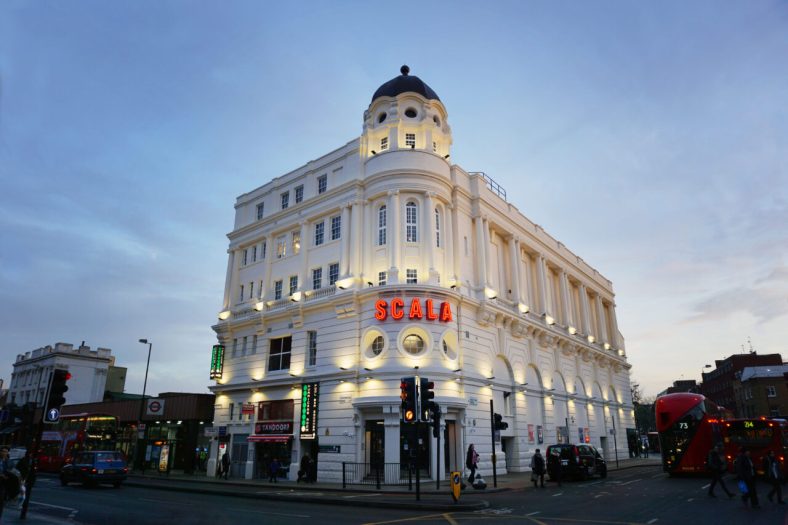‘Scala!!!’ London Film Festival 2023 Review: A Fun Eulogy For The World’s Wildest Cinema

Imagine a setting sleazier than Henenlotter’s New York, weirder than Waters’ Baltimore, and more dangerous than Carpenter’s post-apocalyptic Los Angeles. Welcome to the Scala in London’s King’s Cross, where the only thing wilder than the films are the people watching them.
One of the UK’s most historic venues, the Scala was a repertory cinema from 1978 to 1993. Famed for programming that ruffled feathers and rattled cages—and not just because the theatre stood directly above the rumbling Underground—it was the kind of place your parents might charitably describe as a den of iniquity, where amphetamine-fuelled excess and extracurricular bathroom activities were not only welcome but encouraged.
For those familiar with the cinema, Scala!!!—or, to give the documentary its full, Ray Dennis Steckler-inspired title, Scala!!! Or, the Incredibly Strange Rise and Fall of the World’s Wildest Cinema and How it Influenced a Mixed-up Generation of Weirdos and Misfits—will be a sticky stroll down memory lane. For those who never had the pleasure, the doc offers a glimpse into a theatre unlike any other, a kind of 42nd Street grindhouse as rendered by Hieronymous Bosch.
Also Read: ‘Red Rooms’ London Film Festival 2023 Review: Digital Horror At Its Finest
Co-directed by Ali Catterall and former Scala programmer Jane Giles, on whose 2018 book the documentary is based, Scala!!! unfolds in a scrappy style that echoes the theatre’s against-the-grain nature. Talking heads guide us through its history, from Tottenham Street to its iconic home in King’s Cross, then one of London’s roughest areas, while weaving in raucous tales of ripped-off prostheses, toilet-stall sex, and the occasional dead body.
As well as famous fans such as John Waters (always excellent value), the documentary dedicates time to everyone from attendees and programmers to usherettes and graphic designers. The greatest relics of the Scala are probably its sensational print programs, put together by Mike Leedham. The designer has to unlearn his creative discipline to achieve the disorder that lent the print materials so much life is perhaps the Scala story in a microcosm: forget what you know about the cinema-going experience—the Scala is different. The documentary leans on this rich history of art direction and design, too, adopting vintage grindhouse and exploitation typography for its intertitles.
Also Read: ‘Saltburn’ London Film Festival 2023 Review: A Devilishly Addictive Little Surprise
Not only is the documentary a potent dose of old-school aesthetics, Scala!!! is also a concentrated hit of anti-establishment programming. From Kenneth Anger’s Scorpio Rising and Waters’ Pink Flamingos to Derek Jarman at his most artistic and Russ Meyer at his most “hey, look at these tits!”, the cinema was a celebration of outsider art. Its Shock Around the Clock all-nighters were extremely popular, even if many wayward youths bought a ticket just so they had a place to sleep. It’s Thundercrack!, however, that best represents the Scala slate. The 1975 movie begins as a Rocky Horror-style comedy before quickly whipping out its junk and revealing itself to be a hardcore porn flick. It’s said there was only ever one print of the film, which was screened so regularly that it eventually fell apart.
Such programming attracted an eclectic audience. Actor and former Scala staffer Ralph Brown put it best, paraphrasing Paul Schrader’s script for Taxi Driver when he describes the “animals” that came out at night: the “whores, skunk pussies, buggers, queens, fairies, dopers, junkies, sick, venal”. In kinder and more contemporary terms: the Scala was home to queer and alternative kids then (and now) ostracized by Britain’s Conservative-led government. Between the young, the old, the punks, the post-punks, the new romantics, the people fucking in aisles, and the cinema’s cats, the crowds could be livelier than the screen.
Also Read: ‘The Fall Of The House Of Usher’ Review: Mike Flanagan At His Most Cynical
Many Scala regulars would go on to become creatives, including filmmaker Ben Wheatley, comedian Stewart Lee, writer and artist John Akomfrah, and horror scholar Kim Newman, all of whom contribute to the documentary. Their half-recollections and messed-up chronologies make up the scrapbook that is Scala!!!. If the doc seems to repeat itself across its three roughly divided sections, it’s because the former staff and attendees’ stories are all keenly told and have a similarly glowing (or, rather, grimy) tone.
An illegal screening of A Clockwork Orange in 1992, then banned in the UK, led to a copyright battle with Warner Bros and to Giles’ personal prosecution. The legal furor sapped the Scala’s last resources. The cherished institution was brought to its knees in 1993. London’s wildest theatre went out the same way it came in: with a statement screening of King Kong.
In today’s squeaky clean King’s Cross—more tech giants and trendy markets than knife fights and used syringes—the Scala is a run-of-the-mill nightclub and music venue. But the theatre’s dangerous DIY spirit lives on in Scalarama, an annual UK-wide festival, as well as in London’s other alternative, queer-friendly rep cinemas, including the Prince Charles and the Rio.
Scala!!! maybe a film made primarily to satisfy its own talking heads—a doc by Scala alumni, for Scala alumni—but it’s also an important and appropriately sketchy eulogy for the kind of cultural spaces that are all too rare today. As independents shutter, multiplexes lay off their staff and the media frets unendingly about the “death of the cinema”, it’s refreshing to know that a place like the Scala ever existed, and encouraging to think that it might one day exist again.
Summary
“Scala!!!” is an important and appropriately sketchy eulogy for the kind of cultural spaces that are all too rare today
Categorized:Reviews

